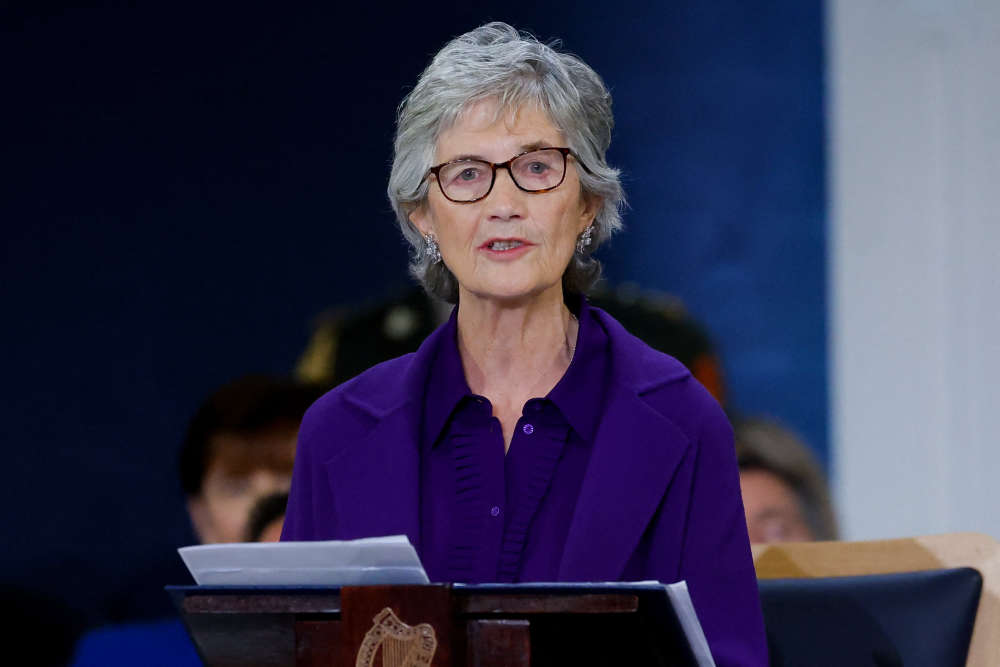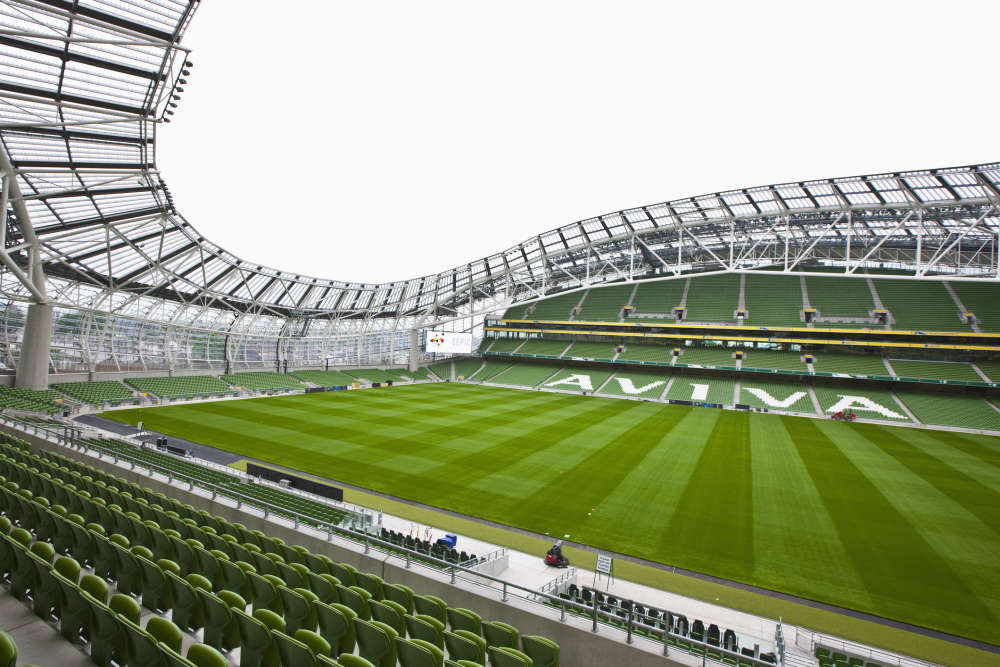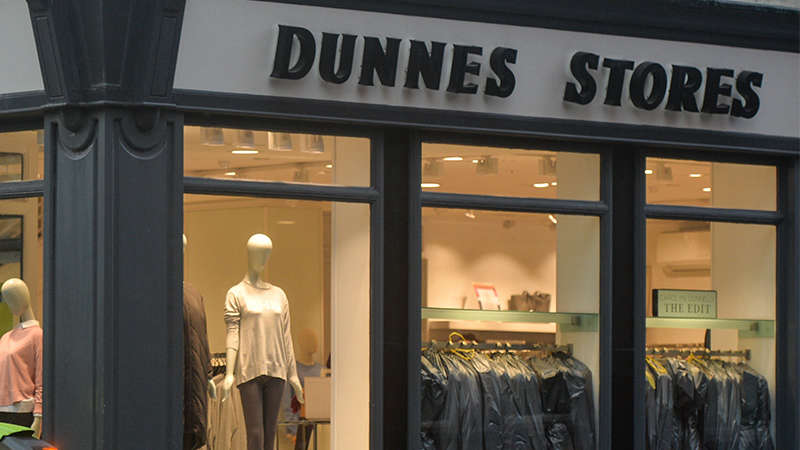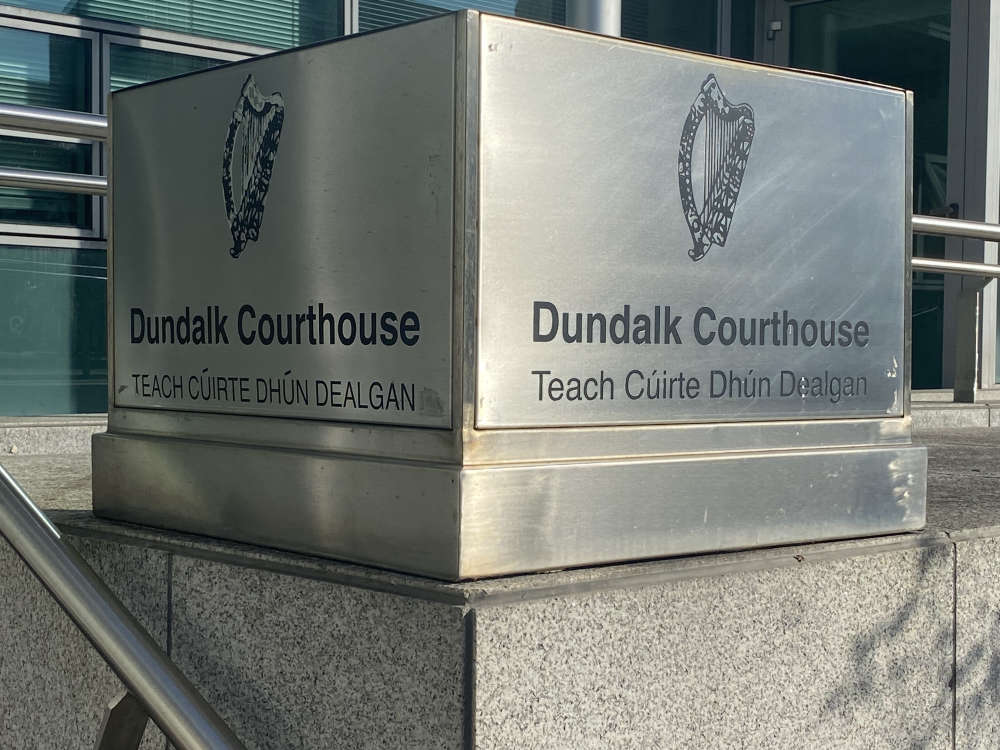
In her first speech as President, Catherine Connolly says she wants to bring people together
New President Catherine Connolly says she wants to unify people, as she begins her seven years in office.
She hosted an inauguration lunch at Aras an Uachtaran after being sworn in at St Patrick's Hall in Dublin Castle.
The ceremony was attended by former Presidents Michael D Higgins, Mary McAleese and Mary Robinson - as well as former Taoisigh Leo Varadkar, Bertie Ahern and Brian Cowen.
In her first speech as President, Catherine Connolly said she wants to bring people together: "I believe that the President should be a unifying President. A steady hand, yes, but also a catalyst for change, reflecting our desire for a republic that lives up to its name.
"I will embrace the role of the President with dignity, determination and courage".
Inaugural Speech of President Catherine Connolly
Dublin Castle
Tuesday, 11th November 2025
A Thaoisigh, A Phríomhbhreithimh, Airí, Baill Chomhairle an Stáit, Baill an Oireachtais, Ambasadóirí, Ceannairí Eaglaise, agus dhaoine uaisle ar fad, chomh maith le an Chéad Aire an Tuaiscirt, Michelle O’Neill, agus ceannairí eile ó gach cairn den Tuaisceart.
Ba mhaith liom céad mile fáilte a chur roimh mo chlann freisin, atá anseo. Mo bheirt mhac, mo fhearchéile, mo dheirfiúracha, mo dheartháireacha, thaisteal siad ó cheann ceann an domhain ó Atlanta, Georgia, ó Ceanada, ó Toronto, agus míle buíochas go chuir siad an dua sin orthu féin.
The people have spoken and have given their President a powerful mandate to articulate their vision for a new Republic.
A Republic worthy of its name where everyone is valued and diversity is cherished, where sustainable solutions are urgently implemented and where a home is a fundamental human right.
The change that led to this joyful day began with a small group of elected representatives and volunteers facing what appeared to be insurmountable challenges.
We were led to believe that it was too great a leap, that our ideas were too far out, too left, at odds with the prevailing narrative.
In shared conversations all over the country, however, it became evident that the dominant narrative did not reflect or represent people’s values and concerns.
Time and time again, people spoke of how it served to silence, to other, to label, to exclude and to stifle critical thinking.
Along with that however, along with meaningful engagement, we saw the emergence of hope, we saw the emergence of joy, along with the courage and determination of people to use their voices to shape a country that we can be proud of.
As President of Ireland, I will ensure that all voices are represented, heard and valued, and promote a public discourse that nourishes inclusivity, tolerance and active citizenship.
Previous Presidents faced different challenges reflecting the dominant issues of the day.
In 1990, when Mary Robinson – and I want to welcome Mary Robinson and her husband Nick – when Mary was elected, the parameters of geopolitics were shifting following the fall of the Berlin Wall the previous year and the dissolution of the Soviet Union, while at home, Ireland was undergoing its own seismic changes laying the foundation for a modern and inclusive society.
In 1997, one year before the Good Friday Agreement, the former President Mary McAleese – and again I want to welcome the former President and husband Martin – was elected in the midst of the ongoing peace process, a landmark event in shaping a shared vision for the future of Ireland.
In 2011, Michael D. Higgins assumed office – and again I want to pay tribute to his courage and his work – Michael D. assumed office as a global financial collapse shook Ireland and the world. The reverberations of that crisis continue to impact upon and shape people’s lives and our economy.
Now in 2025, as I assume the privilege of office, we face the existential threat of climate change and the threat of ongoing wars, both of course are inextricably linked.
As I speak, I am acutely conscious of the 165 million people currently forcibly displaced from their homes and countries due to war, famine and climate change.
We cannot turn back the clock nor close our eyes to these realities.
These are the challenges of our times, and our actions or inaction will determine the world our children and grandchildren will inherit.
It is both an individual and a collective challenge and one which obliges us to reflect on the way we live and interact with our world and with each other.
It is also the responsibility of those entrusted with public office to come together both nationally and internationally to lead and to create the conditions for a sustainable existence on our planet.
It is significant that today is Remembrance Day, the eleventh of the eleventh 2025. It is significant on so many levels, but it gives us an opportunity to pause and reflect on the horrors of war in a world where unfortunately we have all become witnesses to ongoing wars and genocide.
Given our history, the normalisation of war and genocide has never been and will never be acceptable to us.
As a sovereign independent nation with a long and cherished tradition of neutrality and an uninterrupted record of peacekeeping since 1958, Ireland is particularly well placed to lead and articulate alternative diplomatic solutions to conflict and war.
Indeed, our experience of colonisation and resistance, of a catastrophic man-made Famine and forced emigration gives us a lived understanding of dispossession, hunger and war and a mandate for Ireland to lead.
We can and should take real pride in the success of the Good Friday Agreement, knowing that this is recognised far and wide and is a model for peaceful resolution of conflict.
We also know that this journey of peace and reconciliation was the result of meticulous and methodical work over a long period of time, and this work continues to this day.
I look forward to paying my first official visit to the North and meeting with people from all communities and celebrating the rich heritage and traditions of all who live there.
I am particularly conscious of Article 3 of the Constitution, which sets out in detail the firm wish of the Irish people, the Irish nation to have a united Ireland, albeit in the conditions set out very clearly in the Article on consent.
As President, I will foster an inclusive and open dialogue across the island in a manner that highlights and recognises our similarities and respects our differences.
I want to acknowledge our large and growing diaspora. There is hardly a family on this island that does not have a personal experience of migration. On every continent our emigrants have put their ingenuity and hard work at the service of new homelands. Yet they have kept their love of Ireland and its culture deep in their hearts.
I hope over the next 7 years that there will be many opportunities for me to celebrate with them and share our experiences.
I have never believed more in the spirit of this country. Having travelled the length and breadth of the island, I have witnessed it in every county, in every corner of Ireland. I have heard it in the music, the literature and the dance of our people, in the deep tradition of solidarity and decency that continues to be the dominant force behind our people. I have felt it in the quiet dignity and stoicism of those who simply keep going, despite the very real challenges that they face.
Is sibhse, muintir na tíre, cosmhuintir na tíre, a casadh orm agus mé ar fud na tíre a spreag mé, agus a spreag m’fhoireann le linn an fheachtais. Sibhse a chuaigh agus a théann i ngleic le heaspaí seirbhísí agus riachtanais gach lá beo, easpaí nár cheart a bheith fós ann i dtír atá chomh sabhair. Spreag sibh mé le bhur ndúthracht agus bhur bhfláithiúlacht, ag roinnt bhur scéalta agus taithí liom go fial. Is sibhse a thug agus a thugann misneach dom, misneach a bhainfidh mé úsáid as anois agus a thógfaidh mé air agus mé ag obair ar bhur son mar Uachtarán.
Ar ndóigh, tá tábhacht na teanga chun anam agus spioraid na tíre a thabhairt chun cinn tuigthe agam le blianta fada anois; anam agus spioraid a bhí curtha faoi chois le blianta, bíodh sin d’aon ghnó, de bharr smacht na dtíoránach nó de bharr neamhaird, neamhchúram nó easpa tuisceanaí. Tír gan teanga, tír gan anam, agus is fíor sin, mar nuair atá a teanga múchta, ní féidir leis an tír, nó aon tír, a mianta, a luachanna nó a spioraid a chur in iúl.
Cuireadh ár dteanga, teanga ársa ár sinsir, teanga ina bhfuil spioraid ár sinsir agus nádúr ár dtíre le mothú i gchuile fhocal, sa dara háit, gan meas nó ómós tugtha di. Plúchadh croí ár muintir nuair a cuireadh stop leo úsáid a bhaint as a dteanga féin, teanga a chuireann mothúchain agus croí in iúl le chuile fhocal. Ach scaoilimis le chéile anois leis an bhfaitíos sin. Ligfimis don Ghaeilge bláthú. Éistimis leo siúd ar fad nach bhfuil uathu ach aitheantas a bheith tugtha dóibh mar Ghaeilgeoirí ina dtír féin agus in ómós dóibh agus dúinne.
Gaeilgeoirí, Gael, agus lucht foghlama na Gaeilge, ní sa gcúinne á labhairt go híseal a bhéas an Ghaeilge san Áras ach sa chéad áit mar theanga oibre agus beidh sí á labhairt ar fud na tíre go misniúil, go fileata, go ceolmhar, faoi mar atá cloiste agam agus mé ar fud na tíre, agus dár ndóigh, déanfar í a labhairt go húdarásach agus gan aon drogall nuair is gá.
Mar fhocal scoir, to conclude, I believe that the President should be a unifying presence—a steady hand yes, but also a catalyst for change reflecting our desire for a Republic that lives up to its name.
I will embrace the role of the President with dignity, determination and courage.
Go raibh míle maith agaibh.







